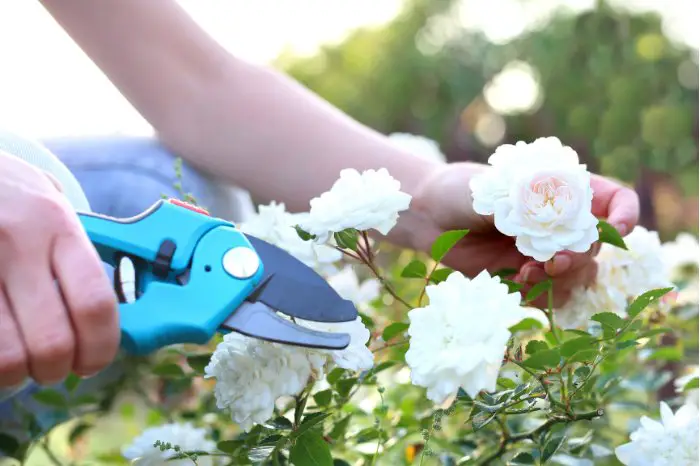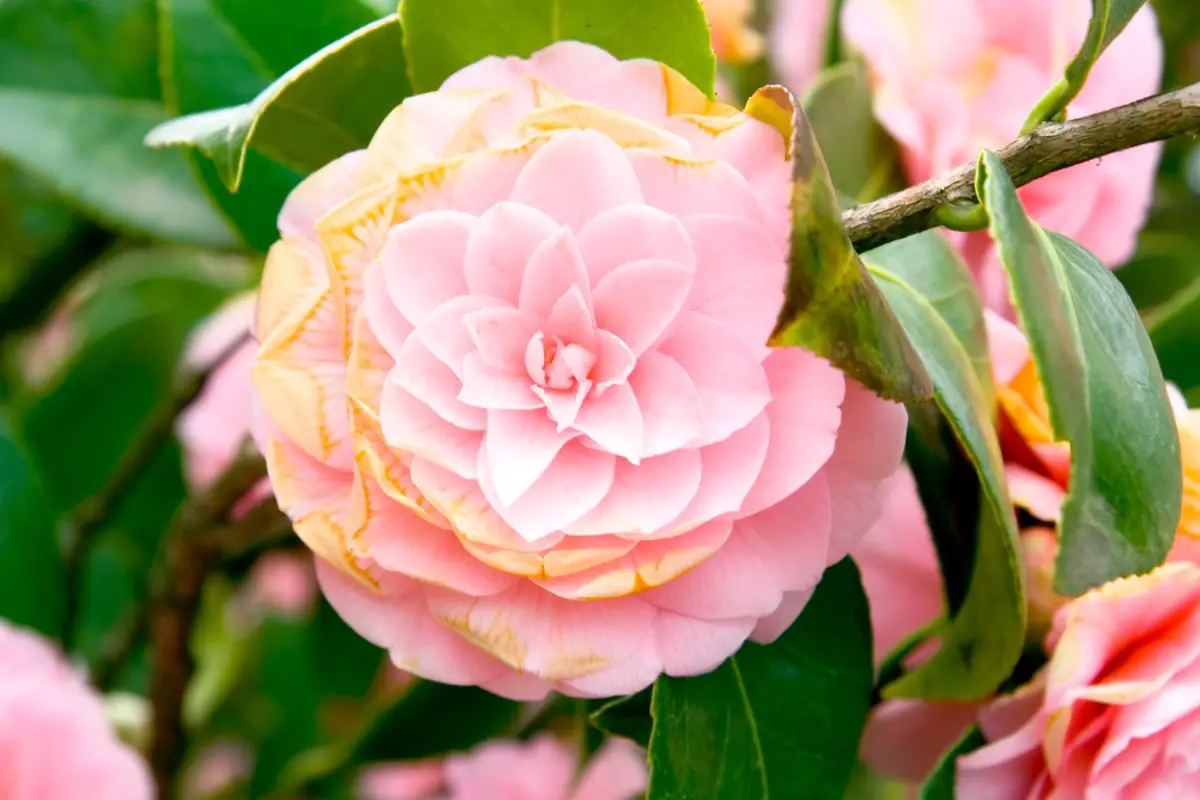Last Updated on December 27, 2022 by Cristina
Why are rose bush leaves turning yellow? There are a number of simple easy-to-fix causes. Read more to discover how you can keep your roses healthy and flourishing again.
What Causes Roses’ Leaves To Turn Yellow?
Leaf yellowing is referred to as chlorosis. This means that the chlorophyll in the leaves is at a low concentration, or absent. Chlorophyll is the green pigment that drives photosynthesis, so if your leaves turn yellow it means they are unable to photosynthesize efficiently, or at all. Your plant will thus eventually starve to death.
The following is a list of causes for rose bush leaves turning yellow:
Too Much, Or Too Little Nitrogen In The Soil
Generally, chlorosis is caused by too much or too little of a nutrient. As an example – if your rose has too little, or too much Nitrogen it can turn yellow. If you have recently added fertilizer to the rose bush, and all of the leaves have turned yellow, there is a good chance you have over-fertilized it. This is why I only like to use organic fertilizers as these release nutrients slowly in a balanced fashion and build up your soil. If you have overfertilized the plant, try to flush the soil with water, and then allow it to recover. You may have killed the plant. Maybe you will be lucky and it may recover.
Iron Deficiency – Rose Bush Leaves Turning Yellow
An Iron deficiency is a common cause of rose bush leaves turning yellow. Iron is essential for photosynthesis – so if your plant cannot absorb enough iron, the leaves will turn yellow. I find that the most efficient method to correct an iron deficiency is by using a micronutrient foliar spray. Often the reason your plant is iron deficient is due to a pH problem, or some other issue in the soil that is making your rose unable to absorb iron.
If you apply the iron directly to the leaves, it is more readily absorbed where it is needed. Chelated iron refers to iron ions that have been bonded to a chelating agent – chelating agents help to transport ions in such a way that they do not get stuck to the soil or become unavailable to your plant. In some cases, you may wish to use a chelated iron spray.
Overwatering
Roses thrive in well-drained soil that is well-aerated and does not have any waterlogging. If the soil gets too wet, the roots tend to drown – and die – and then your rose cannot absorb water, as it has no roots. This is a common problem. If the soil is waterlogged, it can also change the soil pH and this can cause nutrients not to be adequately absorbed by the rose. Even if the roots are not damaged, the change in pH makes the nutrients unavailable to the rose. This will result in rose bush leaves turning yellow.
If you have clay soil, your roses will suffer from yellow leaves during wet periods, hence it is a good idea to either plant your roses in pots with good well-draining loam soil, or to dig holes at least 3-5 feet deep, and fill these holes with well-draining soil.
Use a soil moisture meter to ascertain when your soil is moist, but not wet. Work out the amount of water needed to achieve this level of soil moisture.
Soil pH – Rose Bush Leaves Turning Yellow
A rose requires a soil pH of around 6-6.5 meaning it likes slightly acidic soil. Get your soil tested – if it falls outside this range, rather grow your roses in pots and use balanced rose soil. If the pH falls outside this range we get a phenomenon called nutrient lockout, where the nutrients are present in the soil, but bind to the soil in such a way that the plant cannot absorb them. In this case, you will notice your rose bush leaves turning yellow.
Sun Gro Horticulture Black Gold 1310102 8-Quart All Purpose Potting Soil With Control
Possible Pests
Sometimes diseases can be a cause of rose bush leaves turning yellow. There are many different insect pests of roses that can result in rose bush leaves turning yellow. Inspect the leaves – especially underneath the leaves and look for signs of damage to the leaves – if there are aphids, mites, or other insects such as scale, and so on, these may be the cause.
I find that in my experience, a healthy rose bush is resistant to pests – a sickly rose bush will attract pests. In other words, a rose bush that is in the right soil (see above paragraphs) is not overwatered and is fed a healthy slow-release organic fertilizer, which will generally be resistant to most pests.
Take Out Time to Also Read:
How To Fix Yellow Leaves On Roses
If you have a problem with the rose bush leaves turning yellow, you need to remedy the situation before the rose bush dies. I always follow a simple philosophy with rose bushes – if they look unhealthy, inspect for insect pests such as aphids, scale insects, thrips, etc. Check that the soil is not too wet.
I plant roses in a mix of sandy soil with coconut coir, compost, bone meal, and pearlite mixed into it to avoid rose bush leaves turning yellow. This ensures drainage. Use a slow-release organic fertilizer – chemical fertilizers cause long-term soil problems – hence the use of organic fertilizers bypasses this problem.
You can spray the leaves of your rose bushes a few times a year with a trace element and iron mix – this helps to green the plants up.
Should Yellow Leaves Be Removed From Roses?
Are your rose bush leaves turning yellow? Should you remove the yellow leaves? My general advice with plants is they tend to know what they need to do! Other than pruning rose bushes, I never remove leaves – the bushes drop them when they need to, and these leaves fall to the ground and replenish the soil. If you have an acute outbreak of some pest on the roses, you can consider cutting these leaves off and burning them.

In Conclusion – Rose Bush Leaves Turning Yellow
Roses are very tough plants. If you have a problem with rose bush leaves turning yellow, you need to check that your soil is well-draining, has the correct pH, and balanced organic fertilizer in it. You may spray a trace element mix, rich in chelated iron, on the leaves. If you have poor soil (clay) it may be better to grow your rose bushes in pots.
Dr. Garth A. Cambray is a Canadian/South African entrepreneur and beekeeper with 28 years of experience in apiculture and specializes in adding value to honey. His Ph.D. research developed a new advanced continuous fermentation method for making mead that has resulted in a number of companies globally being able to access markets for mead. His company, Makana Meadery, exports honey mead to the USA where it is available to discerning connoisseurs. He has also developed technologies to commercially manufacture organic honey vinegar in Zambia for export globally. He holds a few patents globally in the ethanol industry and believes in technology and knowledge transfer for human development and environmental sustainability. One of his proudest achievements is the fact that the wind farm he started at one of his old apiary sites has essentially made his hometown carbon neutral.



